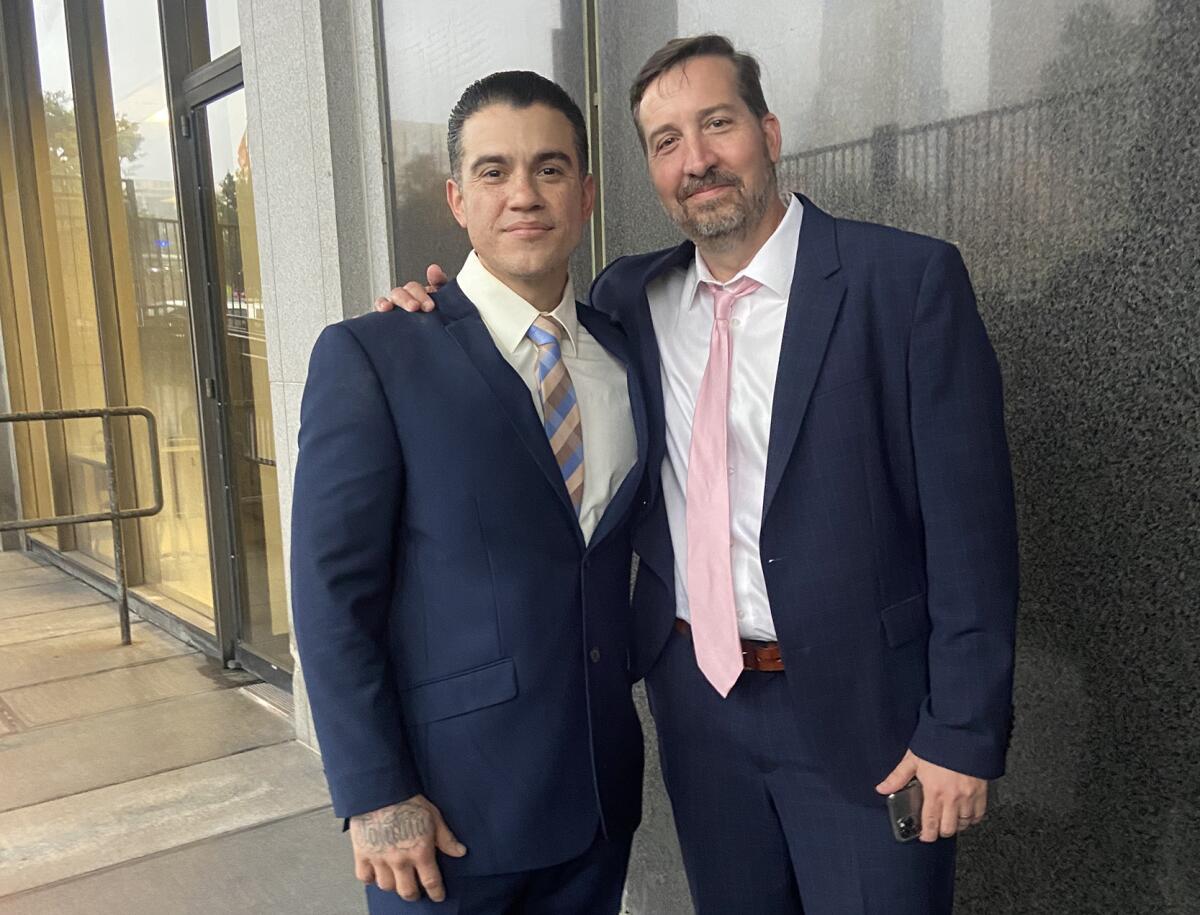Men cleared of murder after 2 decades; ex-detective with ‘absolute belief’ worked to free them

- Share via
Ronald Velasquez Jr., who has spent the last 23 years in prison, wiped tears from his eyes as a Los Angeles Superior Court judge read the order that made him a free man.
Velasquez, his family and a former hard-charging Pasadena police detective had for decades maintained that Velasquez and another man, Abraham Villalobos, were innocent of the 2000 killing of a teenager in Downey.
On Wednesday, Judge William C. Ryan declared the men factually innocent, wiping out their murder convictions.
New investigations by the district attorney’s office and the former detective turned private eye, who worked pro bono, uncovered the actual killer and the events that took place on Sept. 2, 2000.
Kayla Reifschneider, 27, of Northridge was arrested Wednesday and charged over her alleged role in the breach of the U.S. Capitol on Jan. 6, 2021.
In October 2001, Velasquez was found guilty of first-degree murder in the death of teenager Michael Roybal and sentenced to 50 years to life in prison. Villalobos, found guilty of second-degree murder, was sentenced to 15 years.
Investigators later found that Villalobos was not even present when the 16-year-old was shot to death.
Velasquez, who was 18 at the time of the shooting, was on the doorstep of the Downey apartment but knew nothing of another man’s plan to kill Roybal, according to a habeas corpus motion.
That man, Sergio “Silent” Torres, would later confess to one of his relatives that he killed Roybal, according to court filings seeking Velasquez’s release. Torres died a year later in a drive-by shooting, court documents say.
Over the years, appeals were filed and rejected until, from his prison cell in May 2021, Velasquez filed a request for the Los Angeles County district attorney’s Conviction Integrity Unit to review the evidence in his case. The request coincided with county prosecutors stepping up efforts to examine dubious convictions. Attorney John Hanusz, a well-known federal criminal defense lawyer, joined the effort last year.
“There was overwhelming proof of innocence,” Hanusz said. “The Conviction Integrity Unit and the D.A.’s office were receptive and listened to our evidence presentation.”
Hanusz said Velasquez’s family had worked tirelessly for 20 years to demonstrate his innocence, but their “pleas for justice fell on deaf ears.”
It was the pro bono work of Dana Orent that cracked the case, the attorney said. The Pasadena police detective turned private investigator had championed Velasquez’s cause for two decades.
“The evidence was questionable at best,” Hanusz said, “and once Dana Orent chipped away at it, the truth was revealed.”
Orent, in sworn court testimony, said it was one of a handful of cases he had worked on over the years where he had “absolute belief” in the innocence of those convicted.
District attorney’s investigators soon found evidence to support what Orent had uncovered.
Velasquez, a member of the Brown Nation gang, was at a party with Dog Patch gang member Torres and two other men who had been smoking methamphetamine. The group went to an apartment complex to pick up a woman to party, and along the way, Torres also picked up a handgun.
It was about 3 a.m. when the group arrived at the Deming Avenue apartment. Velasquez got out and headed up to the second-floor abode where the woman was meant to be waiting. Torres unexpectedly followed him. When Torres saw Roybal at the door, he thought the teenager was from a rival gang and shot him twice in the chest.
Velasquez in his innocence claim stated that he had no idea that Torres was going to shoot anyone, and he said that Villalobos was never there. Roybal was taken to the hospital and pronounced dead.
Orent during his investigation found evidence that was later verified by D.A. investigators involving the two other men in the car that day. They said they heard gunshots and that, after Torres and Velasquez ran back to the car, Velasquez was yelling at Torres for shooting the victim. Torres bragged that he had shot a “Tuna Fish,” a reference to the Tortilla Flats gang. Velasquez, according to the men, told Torres that Roybal was not a gang member. Torres then aimed his gun at the car’s floorboard and fired.
Both men echoed Velasquez in saying that Villalobos was never there.
The single eyewitness to the killing originally stated she could not see who had committed the crime. But at trial, she identified Velasquez as the shooter.
Adam Vena’s claim that California took his child because he wouldn’t accept the child is transgender went viral. The case is far more complicated than that.
Phone records showed Torres called the woman in the Downey apartment six times after the shooting. According to the motion for factual innocence, he threatened her and her mother and told them not to cooperate with authorities.
”The pattern, times and content of the calls made after the shooting is strong circumstantial evidence of Torres’ guilt,” the motion stated.
Further digging by Orent in 2017 revealed that Torres had confessed his crime to an uncle. The relative said that Torres had a .25-caliber handgun that he dismantled and destroyed. The uncle, suspicious, confronted him, and Torres said he had killed “the fool from Tortilla Flats.”
Torres was killed in an October 2001 drive-by shooting and was under investigation for another slaying at the time of his death, court documents say.
In the motion for factual innocence, lawyers said Torres and Villalobos looked very much alike in 2000, which was the reason Villalobos was accused of being at the scene of the killing.
Villalobos was released from a California prison in 2015. He wasn’t a U.S. citizen, so as a convicted violent felon, he was deported to Mexico. As the criminal case unraveled last year, the Loyola Project for the Innocent came on board to represent him. On Wednesday, his family members listened as the judge set the record straight.
Joe Trigilio, executive director of Project for the Innocent, said he was inspired “by the tenacious work of Mr. Velasquez Jr.’s lawyer John Hanusz and investigator Dana Orent.”
On Wednesday, Velasquez thanked God, his family and supporters. “When you have been where I have been,” he said, “it always a 50-50 shot, but I held to my faith.”
More than 290 people have been exonerated of various charges in California since 1989 and more than 3,400 nationwide. With Ryan’s ruling Wednesday, more than 100 people convicted of murder have seen their convictions wiped away, according to the National Registry of Exonerations.
More to Read
Sign up for Essential California
The most important California stories and recommendations in your inbox every morning.
You may occasionally receive promotional content from the Los Angeles Times.












